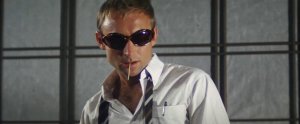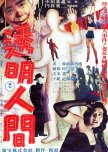You can't try to see something that's invisible.
The second of three Japanese-made Invisible Man films, this time by Toho studios and much more overt in terms of leaning into post-war trauma than Daiei's The Invisible Man Appears. Unlike that film, Toho's production puts the trauma of its characters front and centre with the whole invisibility angle not actually turning up until about halfway through.
In Ginza, the dead body of an invisible man is discovered, alongside a suicide note. The note reveals that there is at least one other invisible man still alive. An ex-army commander reveals that during the war, Dr Nishizaki discovered by chance a particle that, when properly utilized, turns any object invisible. At the end of the Pacific War, a special attack corps made up of invisible men crashed on Saipan Island and were presumed dead, however, two survived. The effects of the invisibility particle cannot be undone.
Another very loose adaptation of the original story, this Invisible Man is far less a deranged killer than some adaptations have made him out to be and is much more focused on a sympathetic portrayal of its titular character. The Invisible Man of this film is much more focused on dismantling an organised crime syndicate that dresses up as the iconic image of the said character in order to commit crimes.
This is the only other film I've seen from Motoyoshi Oda outside of the two edits of Godzilla Raids Again. It's certainly a very moody film and like Raids Again, Oda's direction is solid and made a lot better here thanks to some pretty great editing. There are some great set pieces and a very consistent tone throughout the film and of course, there's Oda's patented car chase by the end. The special effects sequences from Eiji Tsuburaya are very clever but sparingly used, so there's a lot of pressure from the actors to be extremely good at miming which they thankfully fully commit to.
The plot is admittedly very messy in places and can even be almost incomprehensible at times, where this film does triumph however is in its characters. Seizaburo Kawazu as Takamitsu Nanjo, the film's Invisible Man is a tragic character, who was turned invisible against his will in order to help provide the funds to give his mother care, he finds new motivation in order to help a little blind girl finally regain her sight. Like with Godzilla Raids Again, it's wonderful to see Yoshio Tsuchiya in something other than a villainous role, here as Komatsu he assists in uncovering the major connections that link the criminal gangs together as an active driving force behind the plot. The rest of the cast is all pretty good.
Overall, Toho's adaptation of The Invisible Man is another solid little affair, once again less focused on the horror of the original and more focused on the science-fiction aspects of the production. You can see the later influence of their transforming human series starting their development here.
In Ginza, the dead body of an invisible man is discovered, alongside a suicide note. The note reveals that there is at least one other invisible man still alive. An ex-army commander reveals that during the war, Dr Nishizaki discovered by chance a particle that, when properly utilized, turns any object invisible. At the end of the Pacific War, a special attack corps made up of invisible men crashed on Saipan Island and were presumed dead, however, two survived. The effects of the invisibility particle cannot be undone.
Another very loose adaptation of the original story, this Invisible Man is far less a deranged killer than some adaptations have made him out to be and is much more focused on a sympathetic portrayal of its titular character. The Invisible Man of this film is much more focused on dismantling an organised crime syndicate that dresses up as the iconic image of the said character in order to commit crimes.
This is the only other film I've seen from Motoyoshi Oda outside of the two edits of Godzilla Raids Again. It's certainly a very moody film and like Raids Again, Oda's direction is solid and made a lot better here thanks to some pretty great editing. There are some great set pieces and a very consistent tone throughout the film and of course, there's Oda's patented car chase by the end. The special effects sequences from Eiji Tsuburaya are very clever but sparingly used, so there's a lot of pressure from the actors to be extremely good at miming which they thankfully fully commit to.
The plot is admittedly very messy in places and can even be almost incomprehensible at times, where this film does triumph however is in its characters. Seizaburo Kawazu as Takamitsu Nanjo, the film's Invisible Man is a tragic character, who was turned invisible against his will in order to help provide the funds to give his mother care, he finds new motivation in order to help a little blind girl finally regain her sight. Like with Godzilla Raids Again, it's wonderful to see Yoshio Tsuchiya in something other than a villainous role, here as Komatsu he assists in uncovering the major connections that link the criminal gangs together as an active driving force behind the plot. The rest of the cast is all pretty good.
Overall, Toho's adaptation of The Invisible Man is another solid little affair, once again less focused on the horror of the original and more focused on the science-fiction aspects of the production. You can see the later influence of their transforming human series starting their development here.
Cet avis était-il utile?







